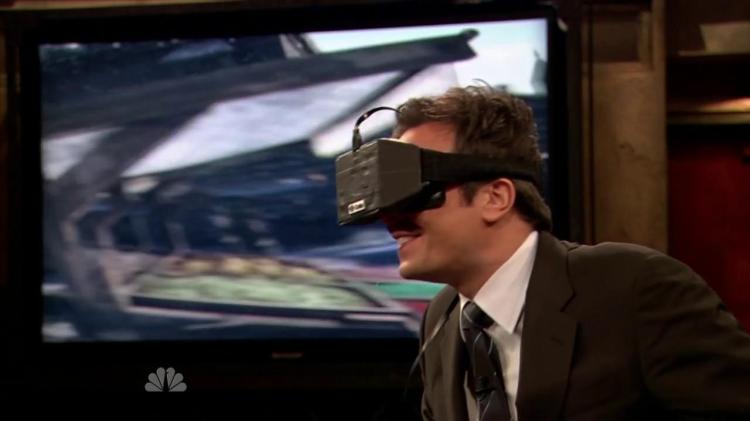Aaron Davies: Let’s get the demo started. Right now you’re in the starting screen for Lucky’s Tale. This is fully immersive as well. You can lean forward, look all around, and see what the level looks like, see where you’re going to be exploring. Hit the A button to start. The controls are simple. With the left thumbstick, move the character around. Jump with the A button. If you hit the trigger in the air, he’ll do a stomp. If you pick up something, you can press Y to throw it. That’s pretty much it.
We have positional tracking now, so if you want to lean forward and look closely at something, you can do it. You can move side to side.
Iribe: What do you think? It’s like a cute little toy that you get to control.
GamesBeat: Are you guys thinking about the possibility of virtual reality as a form of gaming addiction? Things like World of Warcraft wound up having a powerful effect on some people. Virtual reality could take that much further.
Iribe: It’s going to take a while before people are able to spend long periods of time in VR. It’s still early days right now, so it’s something people are only going to be able to enjoy for maybe 10, 20, 30, 60 minutes at a time. That said, for many people, you want to have a comfortable, happy, fun life. If VR brings you a lot of happiness, then why not enjoy it as much as it’s healthy to enjoy, as it becomes a more mature technology?
People sure do spend a lot of time watching TV. The average hours that people watch per day is kind of mind-blowing. If people substitute VR, something that’s much more social and interactive, for just sitting in front of the TV, is that a bad thing? People spend how many hours now staring at their phones? I spend an obscene amount of hours staring at my phone these days.
I can envision cases where people are potentially going to have some kind of illness or disease, whether they’re old or they’re young, something that separates them from their family. Now they’re going to be able to throw on a pair of VR glasses and see their parents or their children. That’s going to bring a level of happiness to so many people that are otherwise largely alone. I can imagine a lot of possibilities where this will add something to people’s lives. It’s going to be a lot of fun.
As the technology gets better, in some decade or two, when all of this is possible in a pair of sunglasses — the whole world wears glasses, right? Nobody has a problem wearing a pair of Ray-Bans in terms of the form factor. When we can put a new set of virtual frames that’s totally comfortable, totally believable virtual vision in a pair of sunglasses, it’ll be a new world for people to enjoy. The exciting thing is that it’s limitless. We’re not stuck to the earth. We’re not stuck to one world.
It’s fascinating to think about virtual presence and a game like EVE Online. EVE Online is a whole world they’ve crafted, a believable world. To some number of hundreds of thousands of people, this world really does exist. The players are thinking about it and trying to convince their brain that yes, this is a real place. But at some point, their brain says, “No, this is a monitor. No, this is a TV screen. It really just exists in this fantasy.”
Now, for the first time, with VR you have a true sense of presence. Your brain will say, “Yes, this is real.” You’ll have to be there going, “No, no, remember, this is not real.” That’s an experience you can’t get from any kind of 2D surface, whether it’s a movie or a game. You can’t do it with augmented reality. You can only do it with VR. A game like EVE Online can become this real place where you go and be social. When you take the glasses off and go about your day, your brain will remember it as a real place.
What inspired me around VR, when I first saw the very first demo, was the thought I had when I took it off — the creative thoughts I had about what this was going to enable, what people were going to create. What if you made this? What if you did that in VR? Even more important and more powerful than just me feeling that way, though — I took it around as a duct-tape prototype and showed it to developers at Epic and Unity. We showed the guys at Valve. Suddenly every single person had the same reaction. They took it off and said, “What if you could do this?” Everybody had an idea coming out of the experience.
It’s only gotten more compelling and more powerful as we’ve gone on. It’s only encouraged more creativity. To see people’s reactions when they take it off – “I can see how this is going to change things” – I’ve never seen another technology have that effect on people. If you give somebody a cell phone, they say, “Wow, this is great. Now I can call a taxi from down on the street.” When you put on Oculus and get into VR and get that sense of presence, people are just streaming with ideas when they come out of it. They’re dreaming about these things. That’s why I think this will be the most powerful platform of all time. Everyone has an idea for it.
GamesBeat: For me, the closest thing might be the Internet, the way it started connecting people. I wonder if that level of imagination now is just changing again.
Iribe: I think we’ve seen PC, Internet, and mobile. But it’s never been as visual as VR. With the internet and everything else, there were people in that world and that space who could project and think, “I know exactly what I’ll do with the web.” But the difference is, it’s not just professional developers. It’s mainstream people. Everybody feels that way. A consumer takes it off and they’ll have awesome ideas, where you think, “That would be cool too!” It’s a widely shared step function, as opposed to just a professional step function. Everybody has an idea.

VentureBeat's mission is to be a digital town square for technical decision-makers to gain knowledge about transformative enterprise technology and transact. Learn More



